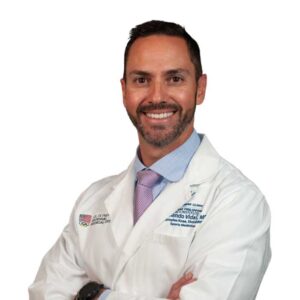What is osteochondritis dissecans?
Osteochondritis Dissecans, or OCD, is a condition that is unique to the young (immature athlete) and occurs when a piece of bone and more importantly, its attached cartilage, breaks down and becomes loose. The loose piece can break away completely from the end of the bone. The condition affects the subchondral bone (deep to the cartilage) and in extreme cases can cause the joint to fail. OCD occurs most often in the knee, but it can affect any joint in the body. Children who participate in high impact sports are more commonly affected than adults. Dr. Armando Vidal, pediatric orthopedic sports medicine specialist, can successfully treat osteochondritis dissecans for patients in Vail, Aspen and the surrounding Denver, Colorado communities. He has extensive experience treating young athletes – having served as director of the sports medicine program at Children’s Hospital Colorado. Additionally, he has some of the most extensive experience in the country in cartilage restoration and repair.
Do only children have OCD?
Osteochondritis dissecans occurs most often in children and adolescents and is most commonly seen in teenagers. Cases of OCD in adults are rare but do occur and are usually a result of an unrecognized condition as an adolescent. The condition is the same: a fragment of bone in a joint separates from the rest of the bone because the blood supply is faulty. Bone without blood supply cannot maintain its stability and a piece can break off.
What causes osteochondritis dissecans?
Dr. Vidal and many other pediatric orthopedic sports medicine specialists believe that OCD is caused by repeated stress to the bone. The repetitive trauma may cause a reduction in blood flow to the ends of the affected bone, causing the damage to occur. There may also be a genetic component that makes some individuals more inclined to develop the disorder.
What are the symptoms of OCD?
Pain is the most common patient complaint for patients in Colorado with osteochondritis dissecans. Kids who have had pain for months may have been dismissed with a “growing pains” diagnosis until later, when mechanical symptoms have resulted. Other symptoms may include:
- Limping, often noticed by parents or coaches
- Weakness in the joint
- The joint locks in place or pops
- Inability to straighten the joint
- Swelling
- Flare-up of symptoms after playing sports or from physical activity
How is OCD diagnosed?
Dr. Vidal will conduct a thorough medical history, as well as a physical examination of the knee. The bone lesions can often be seen on plain X-Ray but MRI remains the gold standard for diagnosis and staging of these lesions.
Is there a cure for osteochondritis dissecans?
The only “cure” for osteochondritis dissecans is to prevent trauma to the injured joint. Treatment for OCD focuses on activity modification, cessation of both organized sports and free play and use of unloading braces. Typically, it will take a stable OCD lesion 3-4 months to heal with this approach. If caught early enough, this strategy has an established track record of success – however some do not heal and require surgery.
How long does it take for an OCD lesion to heal?
Recovery times vary, based on the extent of injury in osteochondritis dissecans of the knee. Treatment can often take 1 to 4 months, followed by physical therapy to strengthen the surrounding muscles. Complete recovery times can take between 3 months to a full year, depending on the severity, child’s age and underlying medical conditions. It is important to be followed carefully by a specialist like Dr. Vidal who has a proven track record of successfully treating osteochondritis dissecans.
Osteochondritis Dissecans Specialist
Osteochondritis dissecans is an injury unique to young athletes where the cartilage in the knee becomes damaged. This condition can result in the knee joint failing, so it is extremely important to see an expert if your child is experiencing osteochondritis dissecans. Pediatric cartilage specialist, Doctor Armando Vidal has years of experience treating children and adults in Vail, Aspen, and the surrounding Denver, Colorado communities who have experienced cartilage damage or injuries. Contact Dr. Vidal's team today!

Locations
180 S Frontage Rd W
Vail, CO 81657
226 Lusher Court
Ste 101
Frisco, CO 80443
322 Beard Creek Road
Edwards, CO 81632


